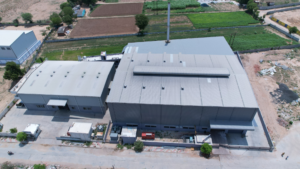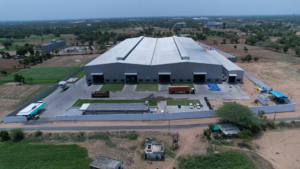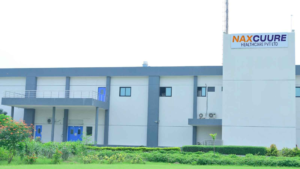Project Overview:
Dhanvi Infracon Pvt. Ltd. proudly undertook the comprehensive design and construction of Usha Plastics’ new manufacturing facility, dedicated to producing high-quality plastic products across multiple industries. Recognized for its engineering precision, Dhanvi was responsible for turning an ambitious industrial vision into a functional, scalable, and modern plant environment.
The facility had to support varied manufacturing lines for injection molding, blow molding, and extrusion processes. From planning efficient floor layouts to integrating utility systems, our task was to deliver a plant that supports innovation, ensures operational fluidity, and stands future-ready.
Key Features of the Project:
- Pre-Engineered Building (PEB): Utilized lightweight and high-strength structures to allow for quicker assembly and lower maintenance.
- Precision Planning: The factory layout was engineered for optimized flow of materials from raw input to finished goods.
- High Roof Clearance: For installing large-scale molding machinery with proper ventilation.
- Zonal Segregation: Divided operational zones based on molding processes, storage, and quality inspection.
- Environmental Compliance: Incorporated a robust ETP (Effluent Treatment Plant) and dust filtration systems.
Technologies Used:
- Building Information Modeling (BIM): For 3D simulation, design accuracy, and MEP integration.
- Smart HVAC Systems: With automated temperature and humidity control suited for plastic molding environments.
- Anti-Static Flooring & ESD Protection: In selected zones to prevent electrostatic damage to sensitive production components.
- Automated Fire Suppression Systems: CO₂-based systems specifically designed for plastic-intensive environments.
- Energy-Efficient Insulation: Thermally efficient wall panels and reflective roof sheets to reduce heat absorption.
Construction Management Approach:
- Turnkey Execution Model: Dhanvi handled every stage, from soil testing and earthwork to final handover.
- Vendor Coordination: Managed machine delivery timelines and ensured infrastructure readiness before installation.
- Dedicated Project Office Onsite: For rapid decision-making, team management, and quality audits.
- Daily Progress Reports & Quality Checks: Maintained consistency and transparency with Usha Plastics’ core management.
- Safety-First Protocol: Ensured zero incidents during construction with site-level safety supervisors and mandatory PPE usage.
Project Challenges:
- Machinery Footprint Customization: Heavy molding machinery needed custom foundations and anchoring setups.
- Time-bound Execution: Project delivery was aligned with global machinery shipment timelines, requiring strict milestone tracking.
- Load-bearing Engineering: Required precision design to support heavy machinery vibration without compromising structure.
- Ventilation & Air Quality Management: Essential in plastic production zones to minimize occupational hazards and maintain indoor air quality.
- High-Power Load Management: Designing infrastructure to accommodate high-voltage and standby generators.
Advantages of the Project:
- Operational Efficiency: The streamlined design enabled smooth transitions between manufacturing processes.
- Future Expansion Ready: The layout and structure are modular and scalable.
- Green Features: Reduced power consumption and optimized lighting with skylights and LED installations.
- Brand-Reflective Architecture: The structure showcases a clean, contemporary industrial look aligned with Usha Plastics’ brand.
- Minimized Maintenance: Use of premium exterior coatings and corrosion-resistant materials.
Disadvantages or Limitations:
- Initial Capital Investment: Higher upfront costs due to high-spec infrastructure and machinery integration.
- Remote Location Hurdles: Longer timelines for material and equipment logistics due to site’s rural location.
- Power Backup Dependency: Despite high-efficiency systems, dependency on diesel generators during outages is a long-term cost.
Future Plans of Usha Plastics & Facility Expansion:
- Phase 2 Manufacturing Line: Introduction of bio-degradable and recyclable plastic product lines.
- Automated Conveyor Systems: For increased speed in packaging and loading.
- Solar Power Integration: Plans to shift 40% of energy consumption to solar within the next 3 years.
- In-House R&D Unit: Expansion to include a research and development section within the facility to innovate plastic compositions.
- Skill Training Centre: Establish a training hub for semi-skilled labor focused on sustainable manufacturing.
Sustainability Practices Incorporated:
- Zero Water Discharge Policy: Implemented rainwater harvesting and greywater recycling.
- Waste Segregation Unit: Built a separate zone for regrind plastic segregation and re-use.
- Eco-Friendly Architecture: Use of recyclable building materials and VOC-free paints.
Impact on the Industry:
This facility positions Usha Plastics to meet rising demand from domestic and export markets. The factory not only meets current regulatory norms but is also structured to adopt newer, cleaner technologies with minimal intervention. It stands as a flagship example of how design, construction, and manufacturing excellence can come together to redefine industry standards.
Conclusion:
The Usha Plastics manufacturing facility project reflects Dhanvi Infracon Pvt. Ltd.’s commitment to quality, innovation, and industrial excellence. Every brick and beam speaks to our belief in future-ready infrastructure. With this project, we didn’t just build a factory; we built a foundation for innovation, sustainability, and continued industry leadership. Usha Plastics is now equipped with a facility that aligns with the global shift toward cleaner, smarter manufacturing — all powered by the expertise of Dhanvi Infracon.





